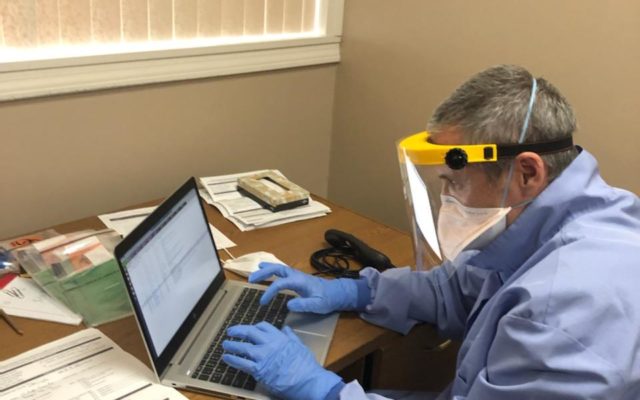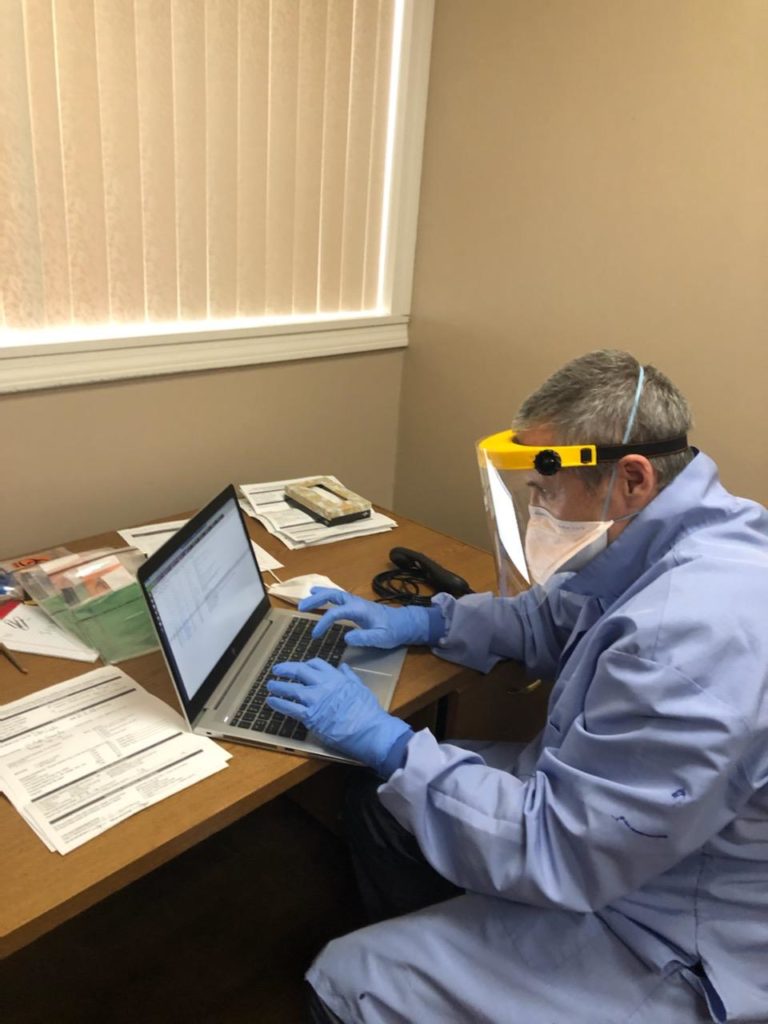
Physician/coach says a winter sports season is ‘almost impossible’
By Larry Mahoney, Bangor Daily News Staff
Dr. Carl Flynn knows as well as anyone the dilemma facing high school sports during the COVID-19 pandemic.
He has been a family physician in Caribou for 26 years and is preparing for his 16th season as the head ice hockey coach at Presque Isle High School.
With an abbreviated fall sports campaign in the books, winter sports coaches, athletes and fans are anxiously waiting to see if there will be a season.
“I think we’re just spinning our wheels. I would be shocked if we had a season,” said the 52-year-old Flynn, who has been administering COVID-19 tests and treating coronavirus patients since March.
The Maine Principals’ Association pushed the starting date for individual practice to Dec. 7, chose Dec. 14 to begin formal team practices and identified Jan. 11, 2021, as the first game date to face regional opponents.

NO SPORTS SEASON — Dr. Carl Flynn of Caribou reviews a patient’s records while wearing equipment to help protect against the spread of COVID-19. Flynn, who is the head coach of the Presque Isle High School hockey team, said Maine isn’t likely to be able to have a winter sports season because of the coronavirus.
Flynn is the longest-serving head coach in the Class B North ranks.
“My outlook is a little different than my fellow coaches,” Flynn said. “Yes, I want to have a season just like they do.”
However, his job as a doctor has given him insight into sports amid COVID-19.
“My main job is more important and is something I trained much more for. And it makes it pretty obvious to me that having a season is almost impossible,” Flynn said.
He realizes that isn’t what his fellow coaches want to hear and he applauds the MPA, state agencies and schools with doing everything they can to offer a winter season for student-athletes.
But the alarming recent surge in coronavirus cases in Maine and across the country certainly are working against those efforts.
Flynn explained that with people moving inside in the colder weather, they are together in more confined spaces where air doesn’t circulate as well.
“That increases the likelihood of being near someone who has it. People are also fatigued about being quarantined and are starting to let their guards down or rebel a little bit,” Flynn said.
The other looming threats are Thanksgiving and Christmas, which he called super-spreader events.
“The MPA specifically chose those dates of Dec. 7 and Jan. 11 because they are two weeks after Thanksgiving and Christmas and they want to see what kind of surge or bump there is so they can make a last-minute decision on whether the winter season is a go or a cancellation,” Flynn said.
He said the cancellation of the cross country state championship meets, which are held outdoors, doesn’t bode well for indoor sports.
Flynn said even with athletes wearing face coverings, which is the new state guidance, there are still a number of ways respiratory droplets can be spread, especially in contact sports like hockey and basketball.
He is nonetheless sympathetic to the needs of athletes and their mental health.
“It’s tough because that is a legitimate concern. The mental health of these high school athletes and their developing, changing brains is very, very important,” Flynn said.
Players and coaches who get COVID-19 are likely to weather it in part because medical professionals are much better at treating the coronavirus now than when the coronavirus struck in March.
However, he said elderly people and those with underlying health issues are vulnerable, so athletes can spread it to their grandparents and older relatives with potentially dire consequences.
There was a lot of AAU basketball played last summer in Maine and it was done successfully and safely under the state’s suggested guidance. Flynn warned that the situation is different now.
“The numbers were low this summer and there wasn’t much community spread. But now there is community spread. That makes it different. We’re dealing with a different animal now than we were this summer,” Flynn said.
Flynn is optimistic there will be a spring sports season for Maine high school athletes. Respiratory illnesses decline in the spring and he said vaccines should be readily available by then.
“You’re talking about low-contact sports that are being played outside,” he said referring to baseball, softball and track and field.